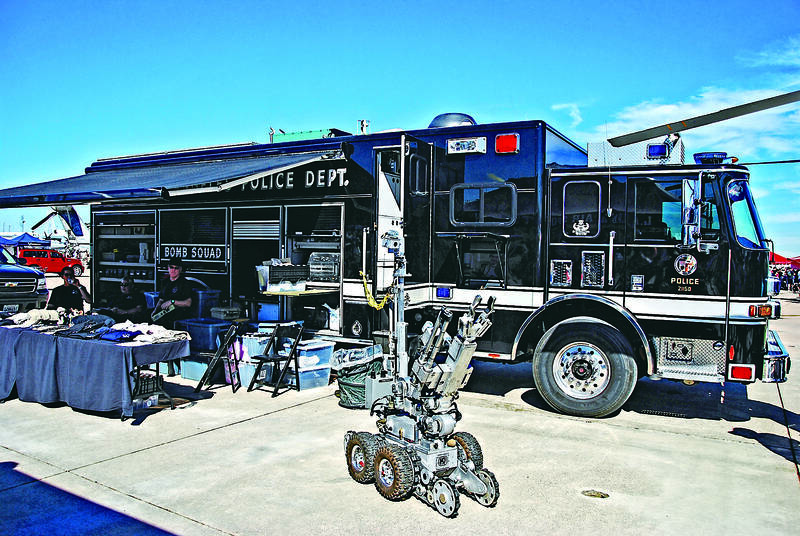A new policy voted in by the San Francisco’s Board of Supervisors has sparked controversy. The city is now allowing the San Francisco Police Department (SFPD) to utilize robots that can administer deadly force. Though shocking, the use of these robots is not unprecedented. In 2016, a robot armed with explosives was used in Dallas, Texas to kill a sniper who had taken the lives of several officers. Praise was given to the Dallas police chief for handling the situation efficiently. Nevertheless, critics of the decision claim that the police did not make a sufficient effort to find alternatives before deploying the robot. With the new policy, the SFPD has become the center of a heated debate.
Advocates of the policy state that with the rise of mass shootings across the US, better solutions must be put in place in order to protect the public and the police. Equipping remotely controlled robots with the ability to contact and incapacitate dangerous suspects is a necessary step in this solution. Furthermore, the new policy would authorize the use of lethal force only in extreme situations where there is an imminent risk to the lives of the public or officers. Approval must also be granted by certain high-ranking officers beforehand.
Several activist groups are strongly against the new policy, asserting that this action will further militarize the US police force. Opponents of the policy fear that by physically distancing themselves from the violence, the police would be more likely to use lethal force, even when it’s not required. Critics say that although the intention of the policy is to protect, an abuse of power could be the actual result.

Photo courtesy of Wikimedia Commons / 照片:維基共享資源提供
Whatever the situation is, the police must act ethically and with the utmost respect for human life. While certain scenarios may arise where the robots are considered necessary, their usage could set a very dangerous precedent.
舊金山市議會表決通過一項新的政策引發了爭議。該市現在允許舊金山警察局(SFPD)使用可以執行致命武力的機器人。儘管令人震驚,但這些機器人的使用並非史無前例。西元2016年,在德州達拉斯,一台裝載炸藥的機器人被用來殺死一名奪走數名警官生命的狙擊手。達拉斯警察局長有效地處理了這一情況,受到了讚揚。然而,該決策的批評者聲稱,警方在部署機器人之前沒有做出足夠的努力來尋找替代方案。隨著新通過的政策,SFPD成了激烈爭論的中心。
該政策的倡導者表示,隨著美國各地大規模槍擊事件的增多,必須制定更好的解決方案以保護大眾和警察。為遙控機器人配備能力,使其能夠接觸危險嫌疑人並讓他們喪失行為能力是該解決方案的必要步驟。此外,新政策將授權僅在大眾或官員的生命面臨迫在眉睫的危險的極端情況下使用致命武力。且還須事先獲得某些高層官員的批准。
一些社運團體強烈反對這項新政策,主張這一行動將進一步使美國的警力軍事化。該政策的反對者擔心,藉著在身體上與暴力保持距離,警察將更有可能使用致命武力,即使在不需要時也是如此。批評者說,雖然該政策的目的是保護,但濫用權力可能才是實際結果。
無論情況如何,警察都必須以符合道德的方式行事,並最大限度地尊重人的生命。雖然在某些情況下可能會發生機器人被認為是必要使用的,但它們的使用可能會開創一個極危險的先例。
MORE INFORMATION
unprecedented adj. 史無前例的;絕無僅有的
sniper n. 狙擊手
incapacitate vt. (使)喪失能力
imminent adj. 即將發生的
militarize vt . 軍事化
utmost adj. 最大的;極度的
precedent n. 先例;判例
KEY VOCABULARY
1. utilize vt. 使用;利用
The artist utilized a variety of painting techniques to create his masterpiece.
那名藝術家利用多樣的繪畫技巧來創造他的傑作。
2. administer v. 實施;管理
The doctors at the hospital were trained in how to administer the new cancer treatment.
該院的醫師受過如何施行新癌症療法的訓練。
3. deploy v. 部署;有效運用;展開
The army deployed soldiers to the border because there was a threat of invasion from another country.
軍隊將士兵部署到邊境,因為有來自另一個國家的入侵威脅。
4. advocate n. 倡導者;擁護人
I spent last summer as an advocate for groups who organize beach cleanups around Taiwan.
去年夏天我為一些組織臺灣地區淨灘活動的團體當倡導者。
5. authorize vt. 授權;批准
James authorized that bank to send payment to the electricity company to pay his bills.
詹姆士授權該銀行向電力公司匯款以支付他的帳單。
6. lethal adj. 致命的;極危險的
Be careful while holding this snake because its bite carries a lethal venom.
捉這種蛇時要小心,因為牠咬人時帶有致命的毒液。
7. beforehand adv. 事先
If you want to travel by train, it’s a good idea to book your ticket beforehand to ensure you get a seat.
如果你想搭乘火車旅行,最好提前訂票以確保你有座位。
8. assert vt. 主張;斷言
The government asserts that its changes to taxes will not make people poorer.
政府主張其稅制改革不會讓人民變得更窮。
9. opponent n. 反對者;對手
Opponents of the new labor law claim it will result in companies shifting production overseas.
這項新勞動法的反對者聲稱它將會導致公司將生產轉移至海外。
學習音檔: https://magazine.english4u.net/Magdata/menu/0o3lv
《空中美語》雜誌APP免費下載: https://www.english4u.net/apps/index.aspx
免費收聽當月《空中美語》雜誌課文朗讀及解析 !
文章由AMC空中美語授權使用: https://www.english4u.net

In an effort to fight phone scams, British mobile phone company O2 has introduced Daisy, an AI designed to engage phone con artists in time-wasting conversations. Daisy is portrayed as a kindly British granny, exploiting scammers’ tendency to target the elderly. Her voice, based on a real grandmother’s for authenticity, adds to her credibility in the role. “O2” has distributed several dedicated phone numbers online to direct scammers to Daisy instead of actual customers. When Daisy receives a call, she translates the scammers’ spoken words into text and then responds to them accordingly through a text-to-speech system. Remarkably, Daisy

Bilingual Story is a fictionalized account. 雙語故事部分內容純屬虛構。 Emma had reviewed 41 resumes that morning. While the ATS screened out 288 unqualified, she screened for AI slop. She could spot it a mile away. She muttered AI buzzwords like curses under her breath. “Team player.” “Results-driven.” “Stakeholder alignment.” “Leveraging core competencies.” Each resume reeked of AI modeling: a cemetery of cliches, tombstones of personality. AI wasn’t just changing hiring. It was draining the humanity from it. Then she found it: a plain PDF cover letter. No template. No design flourishes. The first line read: “I once tried to automate my

Every May 1, Hawaii comes alive with Lei Day, a festival celebrating the rich culture and spirit of the islands. Initiated in 1927 by the poet Don Blanding, Lei Day began as a tribute to the Hawaiian custom of making and wearing leis. The idea was quickly adopted and officially recognized as a holiday in 1929, and leis have since become a symbol of local pride and cultural preservation. In Hawaiian culture, leis are more than decorative garlands made from flowers, shells or feathers. For Hawaiians, giving a lei is as natural as saying “aloha.” It shows love and

1. 他走出門,左右看一下,就過了馬路。 ˇ He walked outside, looked left and right, and crossed the road. χ He walked outside and looked left and right, crossed the road. 註︰並列連接詞 and 在這句中連接三個述語。一般的結構是 x, y, and z。x and y and z 是加強語氣的結構,x and y, z 則不可以。 2. 他們知道自己的弱點以及如何趕上其他競爭者。 ˇ They saw where their weak points lay and how they could catch up with the other competitors. χ They saw where their weak points lay and how to catch up with the other competitors. 註:and 一般連接同等成分,結構相等的單詞、片語或子句。誤句中 and 的前面是子句,後面是不定詞片語,不能用 and 連接,必須把不定詞片語改為子句,and 前後的結構才相等。 3. 她坐上計程車,直接到機場。 ˇ She took a cab, which took her straight to the airport. ˇ She took a cab and it took her straight